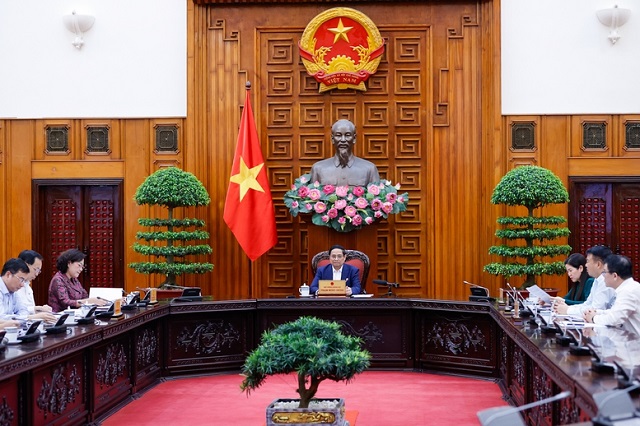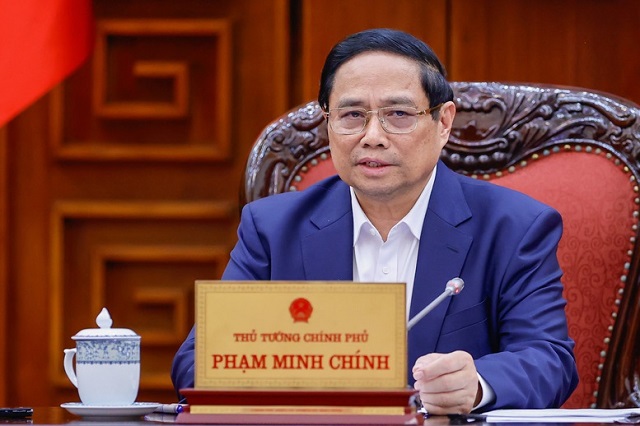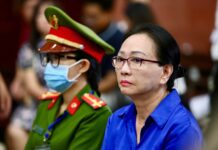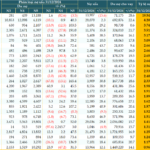
Prime Minister Pham Minh Chinh meets with the State Bank of Vietnam and leaders of several ministries and sectors – Photo: VGP/Nhat Bac
|
In the afternoon of August 5, Prime Minister Pham Minh Chinh met with the leaders of the State Bank of Vietnam (SBV) and several ministries and sectors to discuss monetary policy management.
The meeting was attended by Governor of the SBV Nguyen Thi Hong, representatives from the SBV, the Government Office, the Ministry of Planning and Investment, and the Ministry of Finance.
As of the end of July, credit outstanding reached almost VND 14,330 trillion, up 14.99% from the same period in 2023.
According to a report by the SBV at the meeting, in the first seven months of 2024, the SBV proactively monitored domestic and international economic developments to synchronously implement solutions that facilitate enterprises and people’s access to bank credit, promote production and business recovery, enhance capital absorption capacity, boost growth in alignment with macroeconomic stabilization, curb inflation, and ensure safe operations of the credit institution system.
As of July 31, the central exchange rate stood at VND 24,255 per USD, up 1.63% compared to the end of 2023, and remained relatively low and stable compared to other regional and global currencies.
Interest rates for new and existing loans continued to decrease. By the end of June 2024, the average lending interest rate was 8.3%/year, down 0.96% compared to the end of 2023, while the average deposit interest rate was 3.59%/year, down 1.08% year-on-year.
Credit growth of the entire system recovered from the end of March and increased gradually in subsequent months, surpassing the growth rate in the same period of 2023. By the end of the second quarter of 2024, it reached 6% as directed by the Government and the Prime Minister.
At the end of July 2024, credit outstanding was nearly VND 14,330 trillion, up 14.99% from the same period last year and up 5.66% from the end of 2023.
The SBV, in coordination with ministries, sectors, and localities, implemented credit programs in various sectors and fields, including a VND 120 trillion credit package for social housing and worker housing development, and projects to renovate and rebuild apartment buildings, as well as a credit program for the forestry and fisheries sectors, with a total accumulated capital of VND 34.4 trillion.

Prime Minister Pham Minh Chinh: Continue to proactively, flexibly, timely and effectively manage monetary policy – Photo: VGP/Nhat Bac
|
After listening to the opinions of the participants, Prime Minister Pham Minh Chinh delivered his conclusion, emphasizing the crucial role of monetary policy and the banking system as the lifeblood of the economy. Effective monetary policy management will create favorable conditions and lay a solid foundation for the country’s development, including the growth of various economic sectors.
Therefore, the Government and the Prime Minister regularly hold meetings and work with the SBV and relevant agencies to ensure the smooth and effective implementation of monetary policies, serving the country’s development, the people, and businesses, while preventing any mistakes that could impact the macroeconomic situation and overall development. At the same time, it is essential to ensure the safety and stability of the banking and financial system, especially during periods of fluctuations and uncertainties.
The Prime Minister assessed that the practical situation over the past time has shown that the Government’s orientation from the beginning of the year on “proactive, flexible, timely, and effective monetary policy” is basically appropriate. The SBV has effectively implemented this policy despite numerous difficulties and challenges, in harmony with other policies related to fiscal, trade, and investment, among others. This has contributed to achieving the set goals of macroeconomic stabilization, inflation control, and promoting growth in all three sectors, with the major economic balances ensured and even showing a surplus.
The Prime Minister applauded and commended the efforts and dedication of the SBV and the entire banking system in implementing monetary policies, contributing to the socio-economic development goals. He emphasized the need to continue promoting and further enhancing these efforts in the coming time.
According to the Prime Minister, Vietnam currently has a solid macroeconomic foundation, and international financial organizations have forecasted positive prospects for the country’s economy. However, there are still short-term and long-term challenges in monetary policy management and banking activities, including inflationary pressures, the upward trend in interest rates, insufficient credit growth to meet demands, increased capital demands towards the end of the year, rising foreign currency needs, and risks associated with geopolitical tensions worldwide. In addition, the amount of deposits in the banking system has reached over VND 15 trillion, and the Prime Minister requested measures to utilize these funds effectively to serve production and business activities.
The Prime Minister emphasized the need to remain calm, confident, and steadfast in the face of challenges. He acknowledged the growing maturity and experience of the agencies in policy management and provided several recommendations. These include evidence-based decision-making, drawing on international experience while adapting it to Vietnam’s conditions and long-term goals, avoiding abrupt changes, and ensuring harmonious coordination between different policies. It is also crucial to provide clear and decisive messages and policies that are practical and implemented as committed, learning from experience to improve and expand credit packages to encourage growth drivers.
Recognizing that the challenges ahead outweigh the opportunities and favorable conditions, the Prime Minister requested the agencies to closely monitor and grasp domestic and international developments, identify and seize opportunities and advantages, and maximize Vietnam’s unique potential, competitive advantages, and outstanding opportunities. He emphasized the importance of responsive and effective policy responses, gradually expanding and improving without being overly cautious or hasty, and closely coordinating monetary policy with other policies to promote growth, curb inflation, stabilize the macroeconomy, and ensure monetary security.
Regarding monetary policy, the Prime Minister requested to continue implementing it in line with the Central Committee’s Conclusion No. 64 on socio-economic development in 2023-2024. He emphasized the need for proactive, flexible, timely, and effective management, along with harmonious, close, and consistent coordination with other policies.
Specifically, the Prime Minister directed to aim for a credit growth rate of around 15%, focusing on traditional and new growth drivers. He instructed to manage the exchange rate flexibly using various tools and to continue guiding and encouraging banks to reduce costs and apply information technology and digital transformation to lower lending rates for growth drivers and critical infrastructure projects. State-owned commercial banks should take the lead in achieving “harmonious benefits and shared risks.”
Additionally, the Prime Minister advised managing open market operations in line with market developments, balancing interest rates and exchange rates, and aligning credit policies with macroeconomic conditions, inflation, and capital demands of the economy. He also instructed to withdraw the credit growth target from credit institutions that do not fully utilize it and reallocate it to those with higher growth potential, closely monitor the implementation of preferential credit programs, and promote digital transformation in the banking sector to reduce costs, combat negative practices, and benefit the people.
Along with these measures, he emphasized the need for fundamental and methodical management and control of the gold and foreign currency markets. He also called for intensified efforts in handling bad debts and implementing the project “Restructuring the system of credit institutions associated with bad debt handling in the 2021-2025 period,” with a focus on effectively handling weak credit institutions and restructuring commercial banks under special control in accordance with the directions of authorized agencies.
The Prime Minister highlighted the importance of improving communication and transparency, especially regarding the products of credit institutions, to enhance public understanding. He also emphasized enhanced supervision, inspection, and transparency.
The Prime Minister welcomed the SBV’s proposal to increase the VND 120 trillion credit package for preferential loans for social housing and worker housing development to VND 140 trillion, with extended loan terms and reduced interest rates. He requested careful consideration of appropriate access conditions and ways to effectively implement this humane policy, helping those in need to have a place to live.
Regarding other policies, the Prime Minister requested the Ministry of Finance to take the lead in implementing fiscal policy towards increasing revenue, saving expenses, reducing fees and charges, and lowering VAT. He also emphasized promoting public investment, using it to lead private investment and mobilize all social resources, issuing government bonds with reduced interest rates for key projects and national target programs, and promoting the development of the stock market with a determination to upgrade it from a frontier to an emerging market. He further mentioned the importance of enhancing tax collection, including electronic tax collection.
In terms of trade and investment, the Prime Minister instructed the Ministry of Industry and Trade, the Ministry of Planning and Investment, and the Ministry of Foreign Affairs to promote exports, aiming for a record trade turnover of around USD 750-800 billion and a trade surplus of over USD 20 billion. He encouraged the expansion of payments in local currencies with other countries, the stimulation of domestic consumption, the prevention of smuggling, counterfeit and fake goods, the promotion of border trade, and the effective utilization of signed FTAs, along with the negotiation and expansion of new FTAs. He also emphasized the importance of foreign economic relations, the diversification of markets, products, and supply chains, especially for Halal food.
On the investment front, he urged the promotion of investment, including state investment, private investment, preferential capital such as ODA, and especially the attraction and disbursement of FDI. He highlighted the need for the synchronous and effective implementation of new laws, such as the Law on Land, the Law on Housing, the Law on Real Estate Business, and the Law on Credit Institutions.
Once again, the Prime Minister emphasized the spirit of the meeting, which is to preserve, promote, and enhance the effectiveness of the achievements in monetary policy management and other policies. He expressed his belief in the capacity of the banking sector and relevant ministries and sectors to build on their successes and achieve even better results in the future, contributing to the socio-economic development and the country’s rapid and sustainable progress.
VPBank strengthens its system in 2023, laying the foundation for sustainable growth
By 2023, VPBank has made significant strides in expanding its customer base and scaling up its operations. The bank has managed to make progress amidst challenging macroeconomic conditions, focusing its resources on strengthening its system and building momentum for sustainable growth in 2024 and beyond.







































